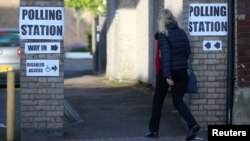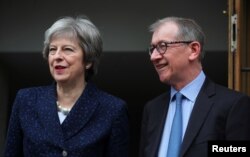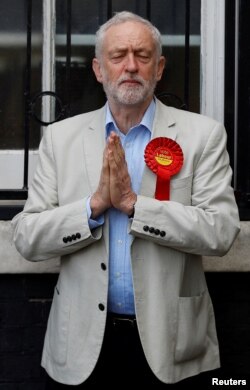Prime Minister Theresa May’s Conservative Party avoided a wipeout in London local elections and eked out gains in Brexit-supporting regions elsewhere, results Friday showed, denting the opposition Labour Party’s hopes of a big win.
The elections are viewed as a gauge of public support for May as she faces a possible revolt in parliament over her strategy for leaving the European Union.
With two-thirds of results declared, May had avoided the kind of widespread losses that would have weakened her authority over Conservative lawmakers ahead of key tests of her plans to take Britain out of the EU customs union as it quits the bloc.
“These results are as good as any government party after eight years in power could expect,” said Tony Travers, a professor at the London School of Economics Department of Government.
“They’ll be a relief for May and the Conservative Party as a whole because they’re suggestive that despite the fact the Conservatives are in an on-and-off civil war over Brexit, the Labour Party’s problems are possibly worse,” he added.
Labour's limitations
Against a backdrop of heightened expectations for the Labour Party, the ballot also showed the limitations of its recent resurgence under veteran socialist Jeremy Corbyn.
May’s party held on to control of Wandsworth council, a low-tax Conservative stronghold since the time of late Prime Minister Margaret Thatcher. The council had been one of Labour’s more ambitious targets in Thursday’s vote and one it campaigned heavily to win.
“Labour will have to do far, far better than this in local elections in future to suggest they are convincing the electorate more generally,” Travers said.
Slim majority in Parliament
Voting decides more than 4,400 council seats, determining the makeup of 150 local government authorities who are responsible for the day-to-day provision of public services.
They do not affect seats in parliament, where May has only a slim working majority, thanks to a deal with a smaller party.
The Conservatives also held the symbolic council of Westminster, London’s political district, indicating that the final scale of losses in the capital would come in at the lower end of the predicted range.
Despite retaining overall control, the Conservatives lost individual seats in Westminster and Wandsworth.
Ruling party losses typical
Ruling parties typically suffer losses at local elections, and opinion polls had predicted a bad night in London for the Conservatives after eight years in power. May is also negotiating an exit from the EU that 60 percent of the capital rejected at the 2016 Brexit referendum.
Results elsewhere in London’s 32 boroughs showed the forecast swing to Labour in the capital had materialized, although not strongly enough to inflict the heavy losses that would pose a serious headache for May.
Corbyn has endured fierce criticism over the handling of anti-Semitism within his party. Critics also say he misjudged his response to military action in Syria and a row with Moscow over the poisoning of a former Russian spy in southern England.
Despite intensive campaigning, Labour did not take overall control of Barnet, a borough previously thought to be easily winnable. May’s Conservatives won back control of the borough, which has the largest Jewish population of any single council area in the country.
Outside London, the Conservatives regained control of councils in the pro-Brexit regions of Peterborough and Basildon, largely at the expense of the anti-EU UK Independence Party (UKIP).
UKIP has suffered leadership issues and struggled for a new purpose since achieving its primary political aim at the 2016 Brexit referendum when Britons decided to leave the EU.
But May’s party lost control of the highly prized council in the Trafford area of the northern city of Manchester, its only foothold in an Labour-dominated important economic region where the Conservatives have spent years trying to win support.







